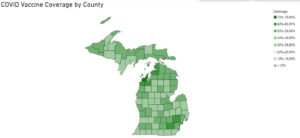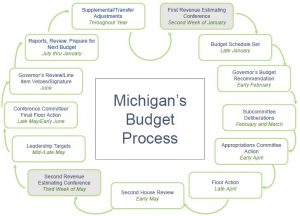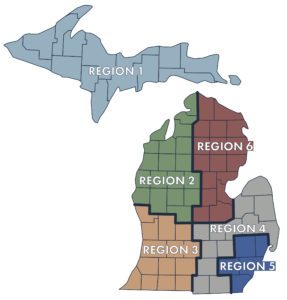Counties can earn, keep interest on ARP funds, Treasury says during video call
 Officials from the U.S. Treasury and the White House gave more context to the American Rescue Plan (ARP) spending rules during a brief video call on Tuesday.
Officials from the U.S. Treasury and the White House gave more context to the American Rescue Plan (ARP) spending rules during a brief video call on Tuesday.
Among the key questions addressed during the 30-minute session:
- Will U.S. Treasury provide “pre-clearance” of a county’s plans to spend its ARP direct investment funds?
There is no preclearance process for programs from Treasury. It will not give entities clearance on programs prior to launching them. It is up to the entity to determine if the program is allowed or not under the guidance provided by Treasury.
- Can you put your ARP direct investment funds in interest-bearing accounts? If so, what uses are allowed for the interest earned?
Yes, a county can put the funds in interest-bearing accounts. The county gets to keep the interest earned and can use it for broader purposes.
- Is there a deadline to apply for the ARP funds?
No, there is no deadline to apply. MAC encourages any county that has not applied through the portal to do so as soon as possible.
- At what level can counties report on payroll support for public safety employees?
The Interim Final Rule does allow for a general allowance for operating units and departments, not just at the individual employee level. It also allows a portion of the time, not necessarily 100 percent. It also notes that you do NOT necessarily need to track the timesheets. But you will need to justify the time estimates. Read page 13 of the new NACo analysis on this specific issue.
- Can recipients use funds for administrative purposes?
Recipients may use funds to cover the portion of payroll and benefits of employees corresponding to time spent on administrative work necessary due to the COVID–19 public health emergency and its negative economic impacts. This includes, but is not limited to, costs related to disbursing payments of Fiscal Recovery Funds and managing new grant programs established using Fiscal Recovery Funds. (Page 15 of the FAQ sheet.)
At mid-week, MAC received an answer to the question of the time period for cost recovery:
“Counties may use Coronavirus State and Local Fiscal Recovery Funds to cover costs incurred during the period beginning March 3, 2021, and ending Dec. 31, 2024, with funds expended on such obligations by Dec. 31, 2026. The funds also clarify that premium pay may be provided retroactively for work performed at any time since the start of the COVID-19 public health emergency, where those workers have yet to be compensated adequately for work previously performed. For a definition on the covered period, please see page 131 of Treasury’s Interim Final Guidance. For more information on premium pay and the associated covered period, see page 50 of the Interim Final Guidance.”
Other questions Treasury addressed this week on their FAQ sheet include:
- May recipients use funds to pay “back to work incentives” (e.g., cash payments for newly employed workers after a certain period of time on the job)?
- What staff are included in “public safety, public health, health care, human services, and similar employees”? Would this include, for example, 911 operators, morgue staff, medical examiner staff, or EMS staff?
- How do I know if a certain type of revenue should be counted for the purpose of computing revenue loss?
NACo Executive Director Matt Chase, who moderated the Tuesday session, urged counties to consult NACo’s new analysis of the initial guidance on spending ARP
Treasury continues to field questions from local officials across the country, so more information will be coming as rules are developed and finalized. Be sure to visit MAC’s Resources Page for the latest on developments on COVID-related aid.
MIOSHA ends remote work mandate, allows vaccinated employees to work without masks or social distancing
 Michigan workplaces can return to largely normal operations effective immediately, Gov. Gretchen Whitmer announced Monday morning.
Michigan workplaces can return to largely normal operations effective immediately, Gov. Gretchen Whitmer announced Monday morning.
Whitmer, speaking from the headquarters of Steelcase in Grand Rapids, said the effectiveness of vaccines and the changing federal guidelines are allowing the Michigan Occupational Safety and Health Administration (MIOSHA) to modify its emergency rules to remove mandates on remote work and allow fully vaccinated workers to operate in offices without masks or social distancing. (In response to a question from a county administrator, MAC confirmed with the state that the federal Health Insurance Portability and Accountability Act [HIPAA] does not block employers from asking employees about their vaccination status.)
Whitmer added, however, that employers must still maintain a COVID-19 preparedness plan and abide by softened cleaning standards for work areas.
MIOSHA’s emergency rules, which run to October 2021, still require masking and social distancing rules for those residents who have not been fully vaccinated.
As of May 26, 58.1 percent of Michiganians age 16 and up had received at least one vaccine shot.
The announcements follow the governor’s comments last week to put the state on the path of lifting all capacity limits on gatherings around Michigan by July 1.
Also on Monday, the Michigan Department of Health and Human Services released its revised order on face masks and gatherings to go into effect on June 1.
MAC testifies against expansion of binding arbitration

Deena Bosworth
MAC testified in opposition this week to legislation making county correctional officers eligible for binding arbitration in labor disputes.
MAC’s Deena Bosworth, governmental affairs director, told the House Commerce and Tourism Committee that counties opposed House Bill 4639 and HB 4725, by Rep. Kelly Breen (D-Oakland) and Rep. Robert Bezotte (R-Howell) respectively, which seek to expand the benefits of Public Act 312 beyond the police and fire labor bargaining units to correctional officers. (Bosworth’s testimony begins at the 50-minute mark of this video.)
MAC has long opposed any expansion of binding arbitration to other bargaining units due to the cost of the process, the long-term liabilities associated with third party decisions and the unequal treatment such a system provides to those particular bargaining units. The Michigan Public Employment Relations Act provides for bargaining rights without tying the hands of the county in binding arbitration.
The committee took no action on the bills this week.
For more information on this issue, contact Deena Bosworth at bosworth@micounties.org
Bipartisan legislation aimed at revamping mental health system
 A bipartisan package to change the state’s behavioral health system, including a proposal to replace the state’s 10 Prepaid Inpatient Health Plans with a single nonprofit or administrative services organization, will soon receive hearings in the House. Under the effort, led by Rep. Mary Whiteford (R-Allegan), the Michigan Department of Health and Human Services (MDHHS) would develop, implement and oversee the core functions of the single services organization.
A bipartisan package to change the state’s behavioral health system, including a proposal to replace the state’s 10 Prepaid Inpatient Health Plans with a single nonprofit or administrative services organization, will soon receive hearings in the House. Under the effort, led by Rep. Mary Whiteford (R-Allegan), the Michigan Department of Health and Human Services (MDHHS) would develop, implement and oversee the core functions of the single services organization.
- House Bill 4925, by Whiteford, creates the administrative services organization (ASO) to replace the current “department-designated community mental health entity.” It also creates a Behavioral Health Oversight Council within MDHHS.
- HB 4926, by Rep. Abdullah Hammoud (D-Wayne), expands the use of Medicaid funds for behavioral health care service.
- HB 4927, by Rep. Phil Green (R-Tuscola), updates terminology in the Public Health Code.
- HB 4928, by Rep. Sue Allor (R-Cheyboygan), updates terminology in the Liquor Control Code.
- HB 4929, by Rep. Shri Thanedar (D-Wayne), updates terminology in the Social Welfare Act.
The plan preserves the current behavioral health carve-out and does not integrate funding with Medicaid health plans. This approach is quite different than previously proposed integration models in the Senate. MAC is reviewing the bills thoroughly and working with partners at the Community Mental Health Association to understand their viewpoint. Please feel free to share thoughts or concerns with MAC as the review continues.
The bills have been referred to the House Committee on Health Policy, chaired by Rep. Bronna Kahle (R-Lenawee). The committee hearings on them will begin next week.
For more information on this issue, contact Meghann Keit-Corrion at keit@micounties.org.
Podcast 83 will resume live episodes on June 7
 MAC’s Podcast 83 team continued to field questions about American Rescue Plan funds and the state budget during their live session on May 24.
MAC’s Podcast 83 team continued to field questions about American Rescue Plan funds and the state budget during their live session on May 24.
To see the video of the episode, click here.
The Podcast 83 team will take a break on Monday, May 31 and reconvene on the web on Monday, June 7 to discuss legislative action in Lansing and Washington, D.C.
Links to past episodes can be found on the podcast webpage, while every 2021 video episode is now available on MAC’s YouTube channel.
 MAC offices to close for holiday
MAC offices to close for holiday
MAC’s Lansing offices will be closed on Monday, May 31 to mark the Memorial Day holiday.
Normal office hours resume on Tuesday, June 1 at 8 a.m.
MAC still needs your voice on 4-year terms
 While legislation to enact four-year terms for county commissioners awaits action on the Senate floor, MAC again asks members to add their individual and collective voices to the campaign.
While legislation to enact four-year terms for county commissioners awaits action on the Senate floor, MAC again asks members to add their individual and collective voices to the campaign.
Senate Bill 242, by Sen. Ed McBroom (R-Dickinson), and SB 245, by Sen. Jeremy Moss (D-Oakland) would bring four-year terms to Michigan in the 2024 presidential election cycle. Enactment of these bills would end Michigan’s status as one of just five states with two-year terms on all commissioners.
The bills are now on the Senate floor.
MAC continues to encourage commissioners to add their voices to the four-year term effort. As of Friday morning, 73 county leaders had responded. Please add your voice to this effort today by clicking here.
MAC also requests that counties adopt official resolutions of support for the legislation. To download a template for this purpose, click here. If you pass such a resolution, please send a copy to Hannah Sweeney at sweeney@micounties.org.
As of Thursday, the following counties had advised MAC of passage of such resolutions: Allegan, Alpena, Bay, Cheboygan, Clinton, Crawford, Dickinson, Emmet, Genesee, Houghton, Huron, Ionia, Isabella, Lenawee, Manistee, Marquette, Mecosta, Newaygo, Ogemaw, Ontonagon, Sanilac, Van Buren, Washtenaw and Wexford.
For more information on this issue, contact Deena Bosworth at bosworth@micounties.org.
SE Michigan counties rack up NACo Achievement Awards
 Five Michigan counties garnered awards from the National Association of Counties this month as part of the 2021 Achievement Awards.
Five Michigan counties garnered awards from the National Association of Counties this month as part of the 2021 Achievement Awards.
Leading the way was Oakland County, with nine citations, including a “Best in Category” for Civic Education/Public Information for its “#Oakland Together COVID-19 Tribute.” The project included crowdsourced story maps for stories and photos of those we have lost to COVID-19 and a Tribute Walk — a half-mile immersive light display that paid homage to those we’ve lost to COVID-19, gave thanks to those who risk their lives to keep us safe and expressed gratitude for those who have helped us through the last year.
Other counties earning recognition were Macomb, Wayne, Washtenaw and Jackson. NACo recognized 844 entries from counties and state associations in 28 states.
Civic Education and Public Information
- Oakland County, #OaklandTogether COVID-19 Tribute (best in category)
- Oakland County, Digital Coronavirus Response
Community and Economic Development
- Washtenaw County, Home for Generations: Grandma’s Will is Not Enough
- Oakland County, ReOpen Kits & Crowdfunding Campaign
- Wayne County, Wayne County Cares Program
Information Technology
- Oakland County, CARES ACT Grant Automation
- Macomb County, COVID-19 Assessment and Tracing
- Oakland County, Cybersecurity Task Force
- Oakland County, Health Connect
- Macomb County, Mobile Workforce
- Oakland County, Oakland Together Lifeline
- Oakland County, Public Safety Transparency Dashboard
- Macomb County, Sheriff Scheduler Application
- Macomb County, Small Business Grant Applications
Parks and Recreation
- Oakland County, Holly Oaks ORV Park
Personnel Management, Employment and Training
- Jackson County, Competency Assessment Committee: A Highway to Organizational Excellence
Transportation
- Jackson County, McDevitt Avenue Reconstruction: Transforming an Old Runway to a New Roadway
Treasury webinar to review state’s fiscal situation
 The next webinar in a series co-sponsored by MAC, the Michigan Treasury and other local government groups will be on Tuesday, June 8.
The next webinar in a series co-sponsored by MAC, the Michigan Treasury and other local government groups will be on Tuesday, June 8.
The session, set for 2 p.m. to 3 p.m. EDT, is intended for such local officials as clerks, treasurers, elected officials, finance directors, auditors and accounting staff, among others.
To register, click HERE.
This will be the 12th webinar in the “Updates and Resources for Local Governments” series and will include:
- An update from the Michigan State Treasureron items related to the Michigan Department of Treasury’s strategic plan and initiatives.
- An update on the May Consensus Revenue Estimating Conference.
Stay tuned for more for information regarding the 13th and 14th “Updates and Resources for Local Governments” webinars — the “American Rescue Plan Act: Metropolitan Communities and Counties” webinar and the “American Rescue Plan Act: Non-Entitlement Communities” webinar. Dates and times for these two upcoming webinars are yet to be announced.
 Staff picks
Staff picks
- Local governments’ underused resource for building local jobs (Governing)
- The death and life of the central business district (City Lab)
- Virginia and New York City are making it easier for workers to save for retirement (Marketwatch)
- GM’s newest vehicle: Off-road, self-driving rover for moon (Associated Press)

 By July 1, Michigan will have lifted all COVID-19 restrictions on the size of indoor and outdoor gatherings, Gov. Gretchen Whitmer announced this week.
By July 1, Michigan will have lifted all COVID-19 restrictions on the size of indoor and outdoor gatherings, Gov. Gretchen Whitmer announced this week. The state of Michigan will have nearly $3 billion more in its General Fund for fiscal years 2021-23 than was expected just a few months ago, a state budget panel determined in its regular meeting on Friday.
The state of Michigan will have nearly $3 billion more in its General Fund for fiscal years 2021-23 than was expected just a few months ago, a state budget panel determined in its regular meeting on Friday. Legislation relating to the goals of the
Legislation relating to the goals of the  Bipartisan bills on bottle deposits that criminalize bottle deposit fraud were reviewed by the House Regulatory Reform Committee this week.
Bipartisan bills on bottle deposits that criminalize bottle deposit fraud were reviewed by the House Regulatory Reform Committee this week. The House Natural Resources and Outdoor Recreation Committee took testimony this week on a bipartisan package of bills that create a “Public Entity Asbestos Removal Disclosure Act” to enhance abatement inspection requirements, establish a verification process for contractors and create reporting violations for asbestos removal.
The House Natural Resources and Outdoor Recreation Committee took testimony this week on a bipartisan package of bills that create a “Public Entity Asbestos Removal Disclosure Act” to enhance abatement inspection requirements, establish a verification process for contractors and create reporting violations for asbestos removal. A bill to direct workers’ compensation coverage on COVID-19 issues was opposed by MAC in committee this week.
A bill to direct workers’ compensation coverage on COVID-19 issues was opposed by MAC in committee this week. While legislation to enact four-year terms for county commissioners awaits action on the Senate floor, MAC again asks members to add their individual and collective voices to the campaign.
While legislation to enact four-year terms for county commissioners awaits action on the Senate floor, MAC again asks members to add their individual and collective voices to the campaign. Eleven Michigan county officials and staff members recently completed the
Eleven Michigan county officials and staff members recently completed the  Attorney General Dana Nessel is reissuing a
Attorney General Dana Nessel is reissuing a  The full House and full Senate this week voted on budget bills for fiscal 2022, with appropriations measures passing largely along party lines and with minimal floor changes.
The full House and full Senate this week voted on budget bills for fiscal 2022, with appropriations measures passing largely along party lines and with minimal floor changes. A bipartisan package of bills aimed at changing the process and fee schedule for accessing and copying records held by county registers of deeds and treasurers was up for testimony this week in the House Commerce and Tourism Committee.
A bipartisan package of bills aimed at changing the process and fee schedule for accessing and copying records held by county registers of deeds and treasurers was up for testimony this week in the House Commerce and Tourism Committee. The Michigan House this week passed, 65-42, a $3.3 billion supplemental appropriation bill, with $1 billion to be drawn from the state’s General Fund and $2.3 billion from the federal Coronavirus Response and Relief Supplemental Appropriations Act.
The Michigan House this week passed, 65-42, a $3.3 billion supplemental appropriation bill, with $1 billion to be drawn from the state’s General Fund and $2.3 billion from the federal Coronavirus Response and Relief Supplemental Appropriations Act. Part of MAC’s 2021 legislative agenda is to gain a one-time payment to compensate dozens of Michigan counties that were shorted proper revenue sharing funds prior to 2015.
Part of MAC’s 2021 legislative agenda is to gain a one-time payment to compensate dozens of Michigan counties that were shorted proper revenue sharing funds prior to 2015. MAC members can view hours of recordings packed with information on key county topics recently presented
MAC members can view hours of recordings packed with information on key county topics recently presented  At the 2021 Michigan Counties Annual Conference (Sept. 26-28 on Mackinac Island), MAC members will vote on five seats on the MAC Board of Directors. Commissioners wishing to serve on the Board, whether incumbents or new candidates, have until Aug. 26 to file official notice of their intent to run. (
At the 2021 Michigan Counties Annual Conference (Sept. 26-28 on Mackinac Island), MAC members will vote on five seats on the MAC Board of Directors. Commissioners wishing to serve on the Board, whether incumbents or new candidates, have until Aug. 26 to file official notice of their intent to run. ( Roughly 75 percent of those who participated in a recent survey in Michigan said they were somewhat or very lonely.
Roughly 75 percent of those who participated in a recent survey in Michigan said they were somewhat or very lonely. The
The  A May 27 webinar on substance abuse disorders will cover the basics on Substance Use Disorder (SUD) and provide participants with knowledge, skills and strategies to manage SUD-related situations as an emergency responder. Development and funding for this course is courtesy of the Michigan Department of Health and Human Services.
A May 27 webinar on substance abuse disorders will cover the basics on Substance Use Disorder (SUD) and provide participants with knowledge, skills and strategies to manage SUD-related situations as an emergency responder. Development and funding for this course is courtesy of the Michigan Department of Health and Human Services.




